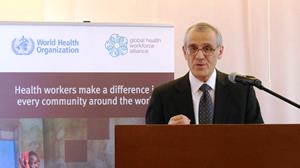 Dr Ala Alwan, WHO Regional Director, said that new approaches were needed to ensure greater protection of people and health workers during conflict21 May 2015 – In a speech at a side meeting "A tribute to health workers" at the World Health Assembly, Dr Ala Alwan, WHO Regional Director for the Eastern Mediterranean, called for respect and safety for health care workers and facilities and paid tribute to the invaluable, and often dangerous work, health and aid workers undertake. He began by paying tribute to the hundreds of health care workers in West Africa, who on the frontline in the battle against Ebola, had contracted the disease. Many had died while helping to save the lives of others.
Dr Ala Alwan, WHO Regional Director, said that new approaches were needed to ensure greater protection of people and health workers during conflict21 May 2015 – In a speech at a side meeting "A tribute to health workers" at the World Health Assembly, Dr Ala Alwan, WHO Regional Director for the Eastern Mediterranean, called for respect and safety for health care workers and facilities and paid tribute to the invaluable, and often dangerous work, health and aid workers undertake. He began by paying tribute to the hundreds of health care workers in West Africa, who on the frontline in the battle against Ebola, had contracted the disease. Many had died while helping to save the lives of others.
In the Eastern Mediterranean Region, health care workers in many countries face challenging circumstances that pose a serious threat to their lives. On a daily basis, they face physical injury, mental trauma and even death. An impact felt also by families, friends and colleagues.
Dr Alwan said that each time there had been an attack on health care workers or premises WHO had urged all parties to respect their obligations under international humanitarian law and the Geneva Conventions, which strictly prohibit attacks on health care premises, vehicles, personnel and patients. While some measures to protect health workers and volunteers had been taken, attacks in the Region and around the world had continued. “The neutrality of health care workers and health facilities is not being respected in many conflicts across the Region. Escalating conflict and the massive scale of humanitarian needs across the Region continue to place health care workers at great risk. What we see today in terms of the magnitude of conflicts and their devastating impact on health is unprecedented and the same is true for the risk to health workers,” he added.
Just 4 weeks ago, two Yemeni Red Crescent paramedics – brothers – were killed when their ambulance was hit as they helped injured patients in Aden. At around the same time, 2 Syrian Red Crescent volunteers were killed while retrieving dead bodies in Idlib. In March, attacks on polio vaccination teams in Pakistan left 4 dead and one injured. In February, 3 aid workers from the Sudanese Red Crescent were killed and one injured after supporting a humanitarian relief mission. In January, 5 health workers were kidnapped by gunmen in Herat province, Afghanistan, during a field visit.
In 2013, attacks on aid workers reached an unprecedented global high, with 75% of attacks taking place in the Region, in Afghanistan, Pakistan, Somalia, Sudan and Syrian Arab Republic. This trend is increasing.
In countries where conflict is ongoing, the negative impact on access to health care has been enormous. Attacks on health care workers and health facilities create shortages of qualified health staff, as health care workers leave with their families. In Iraq, more than 40% of the health workforce has left as a result of the conflict. In Somalia, attacks on health care workers and facilities have forced the suspension of medical activities, delaying critical health and nutrition programmes. When Médicines Sans Frontières ended its 22-year operation in Somalia in August 2013 due to threats to its staff, more than 50 000 people lost access to outpatient medical treatment every month, and a total of 1.5 million people lost access to health care. In Pakistan, recurring fatal security incidents involving polio vaccination teams in Pakistan have resulted in immunization campaigns being cancelled: in 2015 alone, 5 rounds of immunization campaigns were cancelled because of serious security threats.
“We must find new approaches so that we can take more effective and robust action to protect people and health workers during conflicts. At the same time we need to train health care professionals, especially those who are at most risk in protecting their own lives. This is a collective responsibility. Civil society, media, and international institutions should play a role in ensuring that violations are brought to light,” urged Dr Alwan.
As the international community continues to advocate for the protection of health care workers, Dr Alwan encouraged governments to play a greater role by ensuring safe and secure access to health services for all and strengthening accountability for attacks on health. He stressed the need to work together beyond the health sector to ensure that providing health care and life-saving measures did not come at the expense of the lives of health care givers and their patients. He concluded that this was only possible if countries took up this task as a priority.
Related links
Sixty-eighth World Health Assembly, Geneva, Switzerland, 18–26 May 2015
Geneva Conventions of 1948 and additional protocols
Media contact
Rana Sidani
Senior Communication Officer
WHO Regional Office for the Eastern Mediterranean
Direct: +20 2 22765552
Mobile: +20 1099756506
E-mail:








